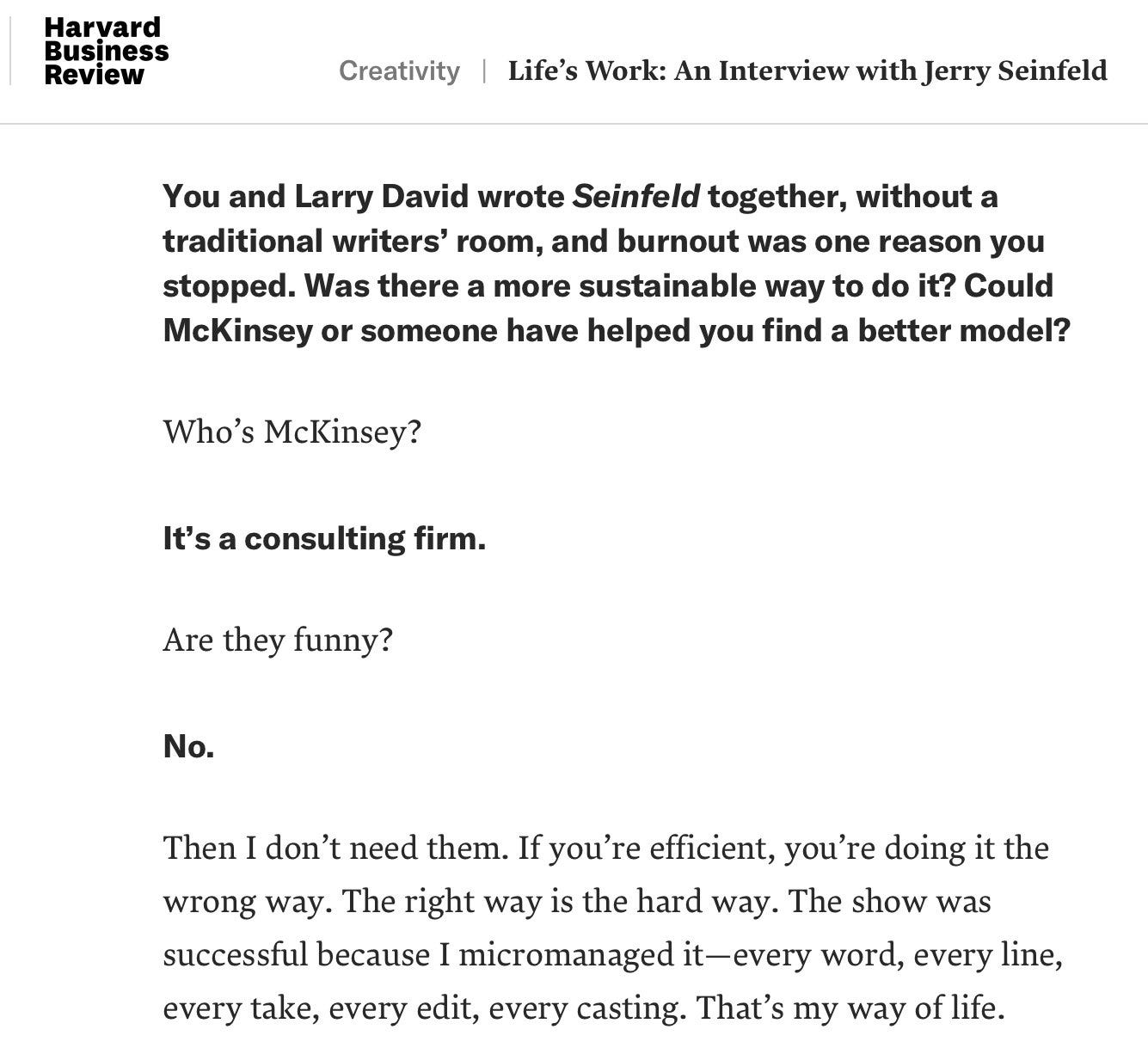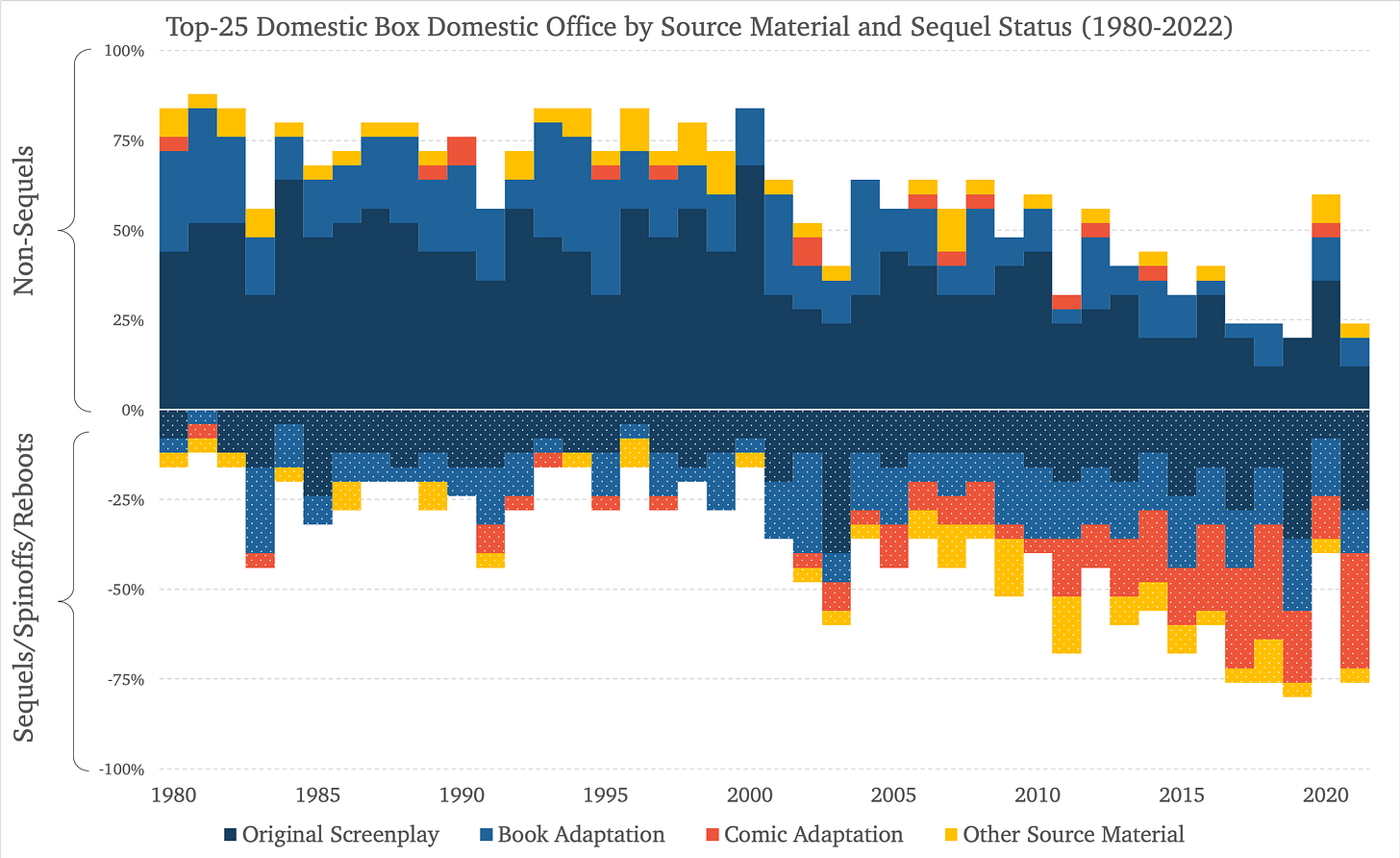Creatives vs bureaucrats
In creative fields, managers and organizations more concerned with process than results will ultimately optimize themselves down to nothing
“What is now proved was once only imagined.” – William Blake
What concerns you more – that your team properly follows templates, formats and processes or they are passionate, express their creativity and are results-driven? This is the difference between being a bureaucrat or a creative. In knowledge economy fields – following templates and processes is second tier to nurturing talent and passion. Not sometimes, always.
Beaurocrats run Hollywood now. They would prefer to use AI and templates over human creative and investment in novel ideas. They wring sequels to death instead of betting on new work with asymmetric upside, because “risk” has been managed out of the equation. Their own users now hate them for it, and if you look at Disney’s path (and stock price) you’ll see this is a losing strategy over the long term. Risk is part of the job, and great creative involves risk-taking.
Big media also wants to manufacture chosen stars because it’s how they’ve done things for two decades now even though that playbook is dead and leads to an inferior product. It’s nihilistic as I shared on that topic previously, creative sectors are stuck if they bias to bean counter thinking. It’s all part of the ‘age of mediocrity’ as my friend Ed Zitron writes.

In a world where no one has a monopoly on attention, treating marketing or media work to use just two examples as if it’s a joyless factory line is a mistake. Your end products will be generic and produce mediocre-at-best results while more creative competitors run circles around you. And yet, time and time again we see managers focusing on the wrong part of the equation.
Of course there is a balance but by far the most important asset your team has at this point, perhaps always, is raw creative prowess. It’s rare, misunderstood and recruiters have not the faintest idea how to source it. And that’s exactly why it’s so valuable. Without that, any sort of rules or processes you’re drawing up to help make things more efficient are irrelevant anyway. Good luck getting noticed with your ultra-efficient blog post or video which lacks any soul or humanity. In a world of infinite choice, these things are dead before you’ve shipped them.
A quote from a 2008 post by my friend David Armano still stands true today:
There are actually few organizations that can support passionate employees—even if they say they want them. That’s because the original industrial revolution was designed to support productivity. Productivity means you produce. That’s how you’re measured. Passion is difficult to quantify, and yet if you ever talk to teams who have produced break through products and innovative solutions—you know it was there. Passionate employees believe in something bigger than themselves. They’re not interested in punching the clock, and sometimes they bend the rules.
Unless your strategy revolves around being fast and cheap (this may work for some ad-driven media companies, but you’re basically just creating more spam for a living) you have to care about what you’re implementing and your team has to care too. Those who purely obsess over things like process are putting pressure on the wrong areas. It’s the exact reason individuals are running circles around your brand and have outsized influence: they are unbound by workflows that, implemented poorly, frustrate your best people. It’s why a 25 year old is the most popular YouTuber and each video he makes is its own organic Super Bowl in terms of attention, not a large media corporation. He’s easily a multi-billion dollar brand and lives in a town in North Carolina, not LA or NYC.
On your team, if someone didn’t follow a process properly but still produced results, do you really care? Are you trying to dictate the steps your team takes, inserting things like AI in places you think it makes sense because you read it in a white paper or McKinsey told you to? If yes, you’re a bureaucrat, a sad excuse for a manager and focused on the wrong things. Harping on adherence is silly and the behavior of an anxious boss who doesn’t trust their team. That’s not why they work for you. They care about interesting projects, not coloring within the lines or taking orders from someone who sees them as a number, not a human being. Smart managers treat processes as something flexible enough to allow for team members to express themselves even if it’s in a slightly different way than the HiPPO (highest paid person’s opinion) might prefer.

And, it’s not just processes and the latest fads/trends. If you are meeting or status-update obsessed, you’re a bureaucrat and don’t really trust your team. Your team can spend their time reporting and placating superiors or they can achieve results for your brand that move the needle. Time spent on one side impacts the other. If you have to micro-manage, you have the wrong team – focus on fixing that, but additional micro-management or layers on bureaucracy is never the solution. In fact, executives at the right teams don’t manage at all in the traditional sense – they lead. As Seth Godin says:
Managers work to get their employees to do what they did yesterday, but a little faster and a little cheaper.
Leaders, on the other hand, know where they’d like to go, but understand that they can’t get there without their tribe, without giving those they lead the tools to make something happen.
Managers want authority. Leaders take responsibility.
Some additional thoughts on this topic for the bureaucrats to keep in mind:
Quality work is what sets your important metrics on fire, providing outsized returns
As I’ve noted many times over the years, you’re wasting your time with cheap/fast work now. No one cares and even if you can make it scale you’re not going to persuade anyone or produce that which stands the test of time. You need ambitious people capable of creating something remarkable if you hope to lead your category. Otherwise you’ll never organically attract a community and grow. No amount of optimization can fix this.

There’s a time and a place for automation/AI
Bureaucratic and process-driven digital managers love the notion of automation and things like AI tools to replace humans – and look, they do have a place. But the creative aspects of this type of work can’t be automated. Those who do might save costs in the short run, but sacrifice any real returns in the long at best, ruin your brand’s reputation in the near-term at worst. And what’s the point of that? There are just some things you should never automate. If you don’t know what they are, you should not be in the position you’re in.
Cheap outsourcing sucks – you get what you pay for
Outsourcing to cheap vendors is poor business practice because even though it saves on cost, it has larger tolls. Someone internally is going to have to fix that mess of work being sent over, and not only is it frustrating it ends up taking more of your team’s time anyway. The dream of cheap outsourcing will never die as it’s so alluring to MBA-types, but everyone learns here eventually. You can definitely outsource by the way, I just said don’t go cheap: you want the $200/hr person not the $20. In a global workforce, everyone can see going rates — do you really want someone not smart enough to use Google helping with a project? If so, good luck to you (and have fun on the weekends you’ll inevitably spend fixing things).
Nurturing a creative team is more defensible than small efficiencies
Talent matters, and while no one is irreplaceable - if you nurture a team of creative, passionate problem solvers they’re going to be able to adapt to changes in the market far better than process driven teams. The world now greatly rewards those who are improvisational and free to experiment vs those stuck in rigid settings. The one constant of the web is change – embrace that, get agile with your marketing and you’ll thrive where others falter. These people will be the ones who actually understand how to create efficiencies if you give them the resource to do so.
Quick wrap
Take a look at what the brands or individuals continually referenced are doing with their digital projects - work that stands out, that’s memorable, that owns the zeitgeist. Notice it’s creative, personal and not easily duplicated. And that’s kind of the point. What will happen when the business and media economy digital divides full bridge? The answer is simple: we’ll look to the most creative minds in the space for consult and leadership — not bureaucrats. Software is going to eat the paint-by-numbers work, but that’s not why we’re here. This has always been the final endgame.





Adam, this is rad. I'm NOT a creative, but perhaps creative adjacent. I am the analyst and pragmatic campaigner. I have process because it HELPS my ability to run a better campaign. That said, I'm always asking myself "am I wrong?". I love working with creative teams (they are fun) and long ago realized they operate in a different realm from what I do. I often tell them "My job is to stay the F out of your way and let you do your thing." But you words have me re-evaluating myself again. And that is good. (Love the Seinfeld comments on McKinsey).
Something I've noticed with technophiles and AI advocates. They always talk about how artists can't keep up with AI. AI will always be able to out produce an artist. As if art is something that should be mass produced.